Top Benefits of Using Conversational AI for Customer Support and Service
Top Benefits of Using Conversational AI for Customer Support and Service
Top Benefits of Using Conversational AI for Customer Support and Service
Know how conversational AI can revolutionize customer support with 24/7 availability, personalization & data-driven insights.
Know how conversational AI can revolutionize customer support with 24/7 availability, personalization & data-driven insights.
Know how conversational AI can revolutionize customer support with 24/7 availability, personalization & data-driven insights.



Customer support is undergoing a revolution, and you're at the forefront of it. Conversational AI, powered by advanced machine learning, is rapidly transforming the way businesses interact with their customers.
By 2030, the conversational AI market is expected to reach a staggering USD 49.9 billion, and for good reason. This technology is poised to deliver significant improvements in customer support and service experiences, making it an essential tool for any business that wants to stay ahead of the curve.
Let's get started with what conversational AI is, what are the benefits of conversational AI, and then explore how it can empower you to provide exceptional customer support.
Introduction to Conversational AI for Customer Support

Conversational AI, also known as conversational interfaces, is technology that lets computers simulate conversation with humans. It's a super-powered chat assistant that can understand your questions and requests. At its core, conversational AI relies on machine learning, a type of artificial intelligence (AI) that allows computers to learn and improve without explicit programming.
So, why is conversational AI such a big deal for customer support?
Here's the thing:
Customers today crave convenience and personalized experiences. Conversational AI offers both. By automating routine tasks and providing 24/7 availability, conversational AI frees up human agents to tackle complex issues.
Plus, these AI-powered assistants can learn from each interaction, getting better at understanding your needs and providing helpful solutions.
Are chatbots and conversational AI same?

No, chatbots and conversational AI are not exactly the same, although the terms are often used interchangeably. Let’s understand its key differences now.
Conversational AI: This is the broader concept, encompassing the technology that allows computers to simulate natural conversation. It uses things like natural language processing (NLP) to understand the meaning behind words, not just keywords. This lets systems respond in a more flexible and engaging way.
Chatbots: These are software programs that use conversation to interact with users. While some chatbots leverage conversational AI for a more natural flow, others rely on simpler methods. These simpler chatbots might use predefined rules and keywords to match user queries with pre-programmed responses.
Simple chatbots might be like a car with a fixed gear system, limited in its responses. Conversational AI-powered chatbots would be more like an automatic car, adapting to different situations and providing a smoother ride.
#1 Enhanced Efficiency and Availability (24/7 Powerhouse)
Customer support is no longer bound by business hours or language barriers. Conversational AI acts as your tireless support agent, delivering three key benefits that boost efficiency and availability.
1. Always On, Always There
Forget the frustration of limited support hours. Conversational AI chatbots are available 24/7, 365 days a year. Imagine needing help at 3 AM – a conversational AI is there to assist you instantly, regardless of your location.
These AI-powered assistants can speak your language! Conversational AI can be programmed to understand and respond in multiple languages, allowing you to serve a global customer base seamlessly. This eliminates the need for dedicated support teams in each region, making your service truly international.

Conversational AI bridges this gap, ensuring consistent and continuous service that keeps customers happy.
2. Freeing Up Your Human Champions
Repetitive tasks like password resets and answering FAQs can bog down your customer service team. Conversational AI automates these inquiries, freeing up valuable time for your human agents. Think of them as champions who excel at complex issues requiring empathy, critical thinking, and problem-solving skills.
A customer forgets their login information. A conversational AI can guide them effortlessly through the password reset process. This allows your human agents to focus on a customer experiencing a more intricate issue, like troubleshooting a product malfunction.
3. Faster Resolutions, Happier Customers
No more waiting on hold or navigating endless menus. Conversational AI streamlines the support process by providing immediate responses to customer inquiries. This significantly improves customer satisfaction and allows you to handle a higher volume of inquiries efficiently.
#2 Customer Experience Revolution
Conversational AI isn't just about efficiency; it's about creating a delightful customer experience. Here's how these AI-powered assistants transform the way you connect with your customers:
1. Personalized Service
They Remember You (Even When You Don't).
Imagine interacting with a support agent who remembers your preferences and purchase history. Conversational AI can analyze customer data to personalize interactions. This can be anything from recommending relevant products based on past purchases to providing tailored troubleshooting steps.
The result? Customers feel valued and understood, leading to a more positive experience.

2. Bye-Bye Wait Times, Hello Instant Support:
Waiting on hold or navigating phone menus can be a major turn-off for customers. Conversational AI tackles this head-on by offering immediate support through automated responses. Simple questions like checking order status or getting product recommendations can be handled instantly, eliminating frustration and keeping customers happy.
3. Contactless Support
The demand for non-physical customer interaction has grown significantly. Conversational AI provides a perfect solution for contactless service. Whether it's through chatbots on your website or voice assistants integrated with smart devices, customers can get the support they need without any physical contact. This caters to evolving customer preferences and ensures a safe and convenient experience.
#3 Saving Money While Serving Better
Conversational AI isn't just about delighting customers, it's about delighting your bottom line too. Here's how these AI assistants deliver significant cost-efficiency benefits:
1. Automating Away Mundane Tasks
Customer service teams often spend a lot of time on repetitive tasks like answering FAQs or processing simple requests. Conversational AI automates these mundane inquiries, freeing up human agents and reducing operational costs. Think of it as eliminating the need for extra staff dedicated solely to handling these repetitive interactions.
2. Redeploying Resources for Strategic Impact
By automating repetitive tasks, conversational AI reduces staffing needs for these inquiries. This allows you to reallocate valuable resources to more strategic areas of your business. Imagine redirecting your human agents to focus on complex customer issues that require a more personalized touch, or to upskilling them in areas that can drive further growth.
3. AI as Your Training Partner
Conversational AI can be a valuable training tool for your human agents. These AI assistants can guide agents through common scenarios and provide real-time feedback on their responses.
This not only enhances the skills of your existing team, but also reduces the need for extensive onboarding for new hires. Conversational AI becomes your always-on training partner, ensuring your team consistently delivers exceptional service.
In a nutshell, conversational AI reduces operational costs by automating mundane tasks, frees up resources for strategic areas, and acts as a training partner for human agents. This translates to a more efficient customer service operation and significant cost savings for your business. It's a win-win for both customer experience and your bottom line.
#4 Unveiling Customer Insights
Conversational AI isn't just about streamlining interactions; it's a goldmine for valuable customer data. Here's how these AI assistants unlock a treasure trove of insights
1. Continuous Conversation, Continuous Insights:
Unlike traditional support methods, conversational AI offers a constant stream of customer interaction. Chatbots and virtual assistants can gather valuable data through every conversation, providing a more comprehensive understanding of your customer base. This data can include customer preferences, pain points, and buying habits.
According to a study by Gartner, 85% of customers will stop business with a company if they experience creepy personalization efforts. Although it's a study made in 2019, the situation is still the same just the percentage varies. Conversational AI, through continuous data collection, fuels the ability to personalize experiences and cater to individual customer needs.
2. Unveiling Customer Behavior Patterns
By analyzing customer conversations, conversational AI can identify patterns in customer behavior and preferences. This allows you to understand what your customers are looking for, the challenges they face, and the products or services that resonate with them most. Imagine being able to predict customer needs before they even arise!
3. Data-Driven Personalization: The Future of Customer Engagement
The data collected through conversational AI interactions is a powerful tool for personalization. This data can be used to personalize recommendations, tailor marketing campaigns, and even proactively address potential customer issues. The result? A more relevant and engaging customer experience that fosters loyalty and drives business growth.
#5 Scaling Up with Ease (Adaptability)
The beauty of conversational AI lies not just in its efficiency, but in its ability to grow alongside your business. Here's how these AI assistants offer unmatched scalability and adaptability:
1. Handling the Customer Influx
As your business expands, so will your customer base and the volume of inquiries. Conversational AI scales effortlessly to handle this growth. Unlike traditional methods that require additional staff, conversational AI chatbots can manage increasing query volumes without incurring significant extra costs.
2. Speaking Every Language, Understanding Every Need
Geographical or linguistic barriers don't limit conversational AI. These AI assistants can be programmed to understand and respond in multiple languages and dialects. This allows you to cater to a wider customer base and offer support in their native language, fostering a more inclusive customer experience.
Additionally, conversational AI can be adapted to handle various customer needs. Its like a single AI assistant seamlessly switching between answering product questions and resolving complex technical issues.
3. Seamless Integration
Conversational AI doesn't exist in a silo. These AI assistants can be seamlessly integrated with your existing customer service platforms. This allows them to access valuable customer data and provide a more personalized and consistent experience across all touchpoints.
Imagine a customer initiating a chat conversation, and the AI assistant already has access to their past purchase history or support tickets. This streamlines the interaction and allows for faster and more effective resolutions.
Challenges and Considerations for Conversational AI

While conversational AI offers a plethora of benefits, it's important to acknowledge the ongoing challenges and considerations.
1. Understanding the Nuances of Human Communication
Language is complex and ever-evolving. Conversational AI can struggle with understanding slang, sarcasm, and other nuances of human communication. Context also plays a crucial role. The same phrase can have different meanings depending on the situation. Ensuring accurate comprehension requires ongoing development and training of AI models to handle the subtleties of human interaction.
2. Balancing Convenience with Customer Privacy
Conversational AI relies on data collection. As with any technology that gathers personal information, customer privacy and security are paramount. Businesses must ensure they have clear and transparent data handling practices in place, and comply with all relevant data privacy regulations. Building trust with customers requires a commitment to responsible data management.
3. Keeping Up with the Evolving Customer Landscape
Customer service practices and expectations are constantly evolving. Conversational AI models need to be continually trained and updated to reflect these changes. This ensures that AI assistants remain effective and relevant in addressing customer needs. Think of it as an ongoing learning process for your AI, keeping it current with the latest trends and best practices in customer service.
Future Prospects of Conversational AI in Customer Support
Conversational AI is rapidly transforming the customer service landscape, and the future holds even more exciting possibilities. Let's explore the trends shaping the future of this technology and how it will redefine customer interactions:
1. The Rise of the Superpower Assistant
Conversational AI is moving beyond basic chatbots. The future holds intelligent virtual assistants with advanced capabilities like sentiment analysis and emotion recognition. Imagine an AI assistant that can not only understand your words but also gauge your emotional state, tailoring its responses to provide empathetic and supportive interactions. These "superpower assistants" will personalize the customer experience to an unprecedented level.
2. Predicting Needs Before They Arise
Conversational AI is poised to become a master predictor. By analyzing vast amounts of customer data and past interactions, AI assistants will be able to anticipate customer needs before they even surface.
Imagine a proactive AI that automatically troubleshoots potential product issues or suggests relevant upgrades based on your usage patterns. This predictive approach will revolutionize customer service, moving from reactive solutions to proactive care.
3. The Power of Combined Forces- AI and Machine Learning
Advancements in AI and machine learning will be the fuel propelling conversational AI to even greater heights. Imagine AI assistants that can learn from every interaction, continuously improving their ability to understand complex questions, solve intricate problems, and deliver exceptional service. This seamless integration of AI and machine learning will transform customer support into a self-learning, constantly evolving entity.
Conclusion
Conversational AI is no longer a futuristic vision; it's the here-and-now of customer service. By acknowledging its challenges, implementing responsible practices, and embracing its potential, businesses can unlock a world of possibilities.
The future of customer service is one where AI assistants act as invisible companions, anticipating needs, resolving issues seamlessly, and creating a delightful customer experience at every touchpoint.
Here's where Metaforms comes in. This platform leverages the benefits of conversational AI to offer a powerful AI-powered form building platform specifically designed for surveys, feedback, and user research.
Our platform goes beyond static questions, allowing you to create dynamic and engaging forms that adapt to user responses in real-time. This fosters deeper customer understanding and generates richer data that can be used to train your conversational AI assistants, propelling them towards becoming those intelligent "superpower assistants" of the future.
Ready to build the future of customer service for your business?
Book a free demo today and see how our platform can help you create next-generation conversational AI experiences that will delight your customers. Your future of conversational AI customer service starts here.
Customer support is undergoing a revolution, and you're at the forefront of it. Conversational AI, powered by advanced machine learning, is rapidly transforming the way businesses interact with their customers.
By 2030, the conversational AI market is expected to reach a staggering USD 49.9 billion, and for good reason. This technology is poised to deliver significant improvements in customer support and service experiences, making it an essential tool for any business that wants to stay ahead of the curve.
Let's get started with what conversational AI is, what are the benefits of conversational AI, and then explore how it can empower you to provide exceptional customer support.
Introduction to Conversational AI for Customer Support

Conversational AI, also known as conversational interfaces, is technology that lets computers simulate conversation with humans. It's a super-powered chat assistant that can understand your questions and requests. At its core, conversational AI relies on machine learning, a type of artificial intelligence (AI) that allows computers to learn and improve without explicit programming.
So, why is conversational AI such a big deal for customer support?
Here's the thing:
Customers today crave convenience and personalized experiences. Conversational AI offers both. By automating routine tasks and providing 24/7 availability, conversational AI frees up human agents to tackle complex issues.
Plus, these AI-powered assistants can learn from each interaction, getting better at understanding your needs and providing helpful solutions.
Are chatbots and conversational AI same?

No, chatbots and conversational AI are not exactly the same, although the terms are often used interchangeably. Let’s understand its key differences now.
Conversational AI: This is the broader concept, encompassing the technology that allows computers to simulate natural conversation. It uses things like natural language processing (NLP) to understand the meaning behind words, not just keywords. This lets systems respond in a more flexible and engaging way.
Chatbots: These are software programs that use conversation to interact with users. While some chatbots leverage conversational AI for a more natural flow, others rely on simpler methods. These simpler chatbots might use predefined rules and keywords to match user queries with pre-programmed responses.
Simple chatbots might be like a car with a fixed gear system, limited in its responses. Conversational AI-powered chatbots would be more like an automatic car, adapting to different situations and providing a smoother ride.
#1 Enhanced Efficiency and Availability (24/7 Powerhouse)
Customer support is no longer bound by business hours or language barriers. Conversational AI acts as your tireless support agent, delivering three key benefits that boost efficiency and availability.
1. Always On, Always There
Forget the frustration of limited support hours. Conversational AI chatbots are available 24/7, 365 days a year. Imagine needing help at 3 AM – a conversational AI is there to assist you instantly, regardless of your location.
These AI-powered assistants can speak your language! Conversational AI can be programmed to understand and respond in multiple languages, allowing you to serve a global customer base seamlessly. This eliminates the need for dedicated support teams in each region, making your service truly international.

Conversational AI bridges this gap, ensuring consistent and continuous service that keeps customers happy.
2. Freeing Up Your Human Champions
Repetitive tasks like password resets and answering FAQs can bog down your customer service team. Conversational AI automates these inquiries, freeing up valuable time for your human agents. Think of them as champions who excel at complex issues requiring empathy, critical thinking, and problem-solving skills.
A customer forgets their login information. A conversational AI can guide them effortlessly through the password reset process. This allows your human agents to focus on a customer experiencing a more intricate issue, like troubleshooting a product malfunction.
3. Faster Resolutions, Happier Customers
No more waiting on hold or navigating endless menus. Conversational AI streamlines the support process by providing immediate responses to customer inquiries. This significantly improves customer satisfaction and allows you to handle a higher volume of inquiries efficiently.
#2 Customer Experience Revolution
Conversational AI isn't just about efficiency; it's about creating a delightful customer experience. Here's how these AI-powered assistants transform the way you connect with your customers:
1. Personalized Service
They Remember You (Even When You Don't).
Imagine interacting with a support agent who remembers your preferences and purchase history. Conversational AI can analyze customer data to personalize interactions. This can be anything from recommending relevant products based on past purchases to providing tailored troubleshooting steps.
The result? Customers feel valued and understood, leading to a more positive experience.

2. Bye-Bye Wait Times, Hello Instant Support:
Waiting on hold or navigating phone menus can be a major turn-off for customers. Conversational AI tackles this head-on by offering immediate support through automated responses. Simple questions like checking order status or getting product recommendations can be handled instantly, eliminating frustration and keeping customers happy.
3. Contactless Support
The demand for non-physical customer interaction has grown significantly. Conversational AI provides a perfect solution for contactless service. Whether it's through chatbots on your website or voice assistants integrated with smart devices, customers can get the support they need without any physical contact. This caters to evolving customer preferences and ensures a safe and convenient experience.
#3 Saving Money While Serving Better
Conversational AI isn't just about delighting customers, it's about delighting your bottom line too. Here's how these AI assistants deliver significant cost-efficiency benefits:
1. Automating Away Mundane Tasks
Customer service teams often spend a lot of time on repetitive tasks like answering FAQs or processing simple requests. Conversational AI automates these mundane inquiries, freeing up human agents and reducing operational costs. Think of it as eliminating the need for extra staff dedicated solely to handling these repetitive interactions.
2. Redeploying Resources for Strategic Impact
By automating repetitive tasks, conversational AI reduces staffing needs for these inquiries. This allows you to reallocate valuable resources to more strategic areas of your business. Imagine redirecting your human agents to focus on complex customer issues that require a more personalized touch, or to upskilling them in areas that can drive further growth.
3. AI as Your Training Partner
Conversational AI can be a valuable training tool for your human agents. These AI assistants can guide agents through common scenarios and provide real-time feedback on their responses.
This not only enhances the skills of your existing team, but also reduces the need for extensive onboarding for new hires. Conversational AI becomes your always-on training partner, ensuring your team consistently delivers exceptional service.
In a nutshell, conversational AI reduces operational costs by automating mundane tasks, frees up resources for strategic areas, and acts as a training partner for human agents. This translates to a more efficient customer service operation and significant cost savings for your business. It's a win-win for both customer experience and your bottom line.
#4 Unveiling Customer Insights
Conversational AI isn't just about streamlining interactions; it's a goldmine for valuable customer data. Here's how these AI assistants unlock a treasure trove of insights
1. Continuous Conversation, Continuous Insights:
Unlike traditional support methods, conversational AI offers a constant stream of customer interaction. Chatbots and virtual assistants can gather valuable data through every conversation, providing a more comprehensive understanding of your customer base. This data can include customer preferences, pain points, and buying habits.
According to a study by Gartner, 85% of customers will stop business with a company if they experience creepy personalization efforts. Although it's a study made in 2019, the situation is still the same just the percentage varies. Conversational AI, through continuous data collection, fuels the ability to personalize experiences and cater to individual customer needs.
2. Unveiling Customer Behavior Patterns
By analyzing customer conversations, conversational AI can identify patterns in customer behavior and preferences. This allows you to understand what your customers are looking for, the challenges they face, and the products or services that resonate with them most. Imagine being able to predict customer needs before they even arise!
3. Data-Driven Personalization: The Future of Customer Engagement
The data collected through conversational AI interactions is a powerful tool for personalization. This data can be used to personalize recommendations, tailor marketing campaigns, and even proactively address potential customer issues. The result? A more relevant and engaging customer experience that fosters loyalty and drives business growth.
#5 Scaling Up with Ease (Adaptability)
The beauty of conversational AI lies not just in its efficiency, but in its ability to grow alongside your business. Here's how these AI assistants offer unmatched scalability and adaptability:
1. Handling the Customer Influx
As your business expands, so will your customer base and the volume of inquiries. Conversational AI scales effortlessly to handle this growth. Unlike traditional methods that require additional staff, conversational AI chatbots can manage increasing query volumes without incurring significant extra costs.
2. Speaking Every Language, Understanding Every Need
Geographical or linguistic barriers don't limit conversational AI. These AI assistants can be programmed to understand and respond in multiple languages and dialects. This allows you to cater to a wider customer base and offer support in their native language, fostering a more inclusive customer experience.
Additionally, conversational AI can be adapted to handle various customer needs. Its like a single AI assistant seamlessly switching between answering product questions and resolving complex technical issues.
3. Seamless Integration
Conversational AI doesn't exist in a silo. These AI assistants can be seamlessly integrated with your existing customer service platforms. This allows them to access valuable customer data and provide a more personalized and consistent experience across all touchpoints.
Imagine a customer initiating a chat conversation, and the AI assistant already has access to their past purchase history or support tickets. This streamlines the interaction and allows for faster and more effective resolutions.
Challenges and Considerations for Conversational AI

While conversational AI offers a plethora of benefits, it's important to acknowledge the ongoing challenges and considerations.
1. Understanding the Nuances of Human Communication
Language is complex and ever-evolving. Conversational AI can struggle with understanding slang, sarcasm, and other nuances of human communication. Context also plays a crucial role. The same phrase can have different meanings depending on the situation. Ensuring accurate comprehension requires ongoing development and training of AI models to handle the subtleties of human interaction.
2. Balancing Convenience with Customer Privacy
Conversational AI relies on data collection. As with any technology that gathers personal information, customer privacy and security are paramount. Businesses must ensure they have clear and transparent data handling practices in place, and comply with all relevant data privacy regulations. Building trust with customers requires a commitment to responsible data management.
3. Keeping Up with the Evolving Customer Landscape
Customer service practices and expectations are constantly evolving. Conversational AI models need to be continually trained and updated to reflect these changes. This ensures that AI assistants remain effective and relevant in addressing customer needs. Think of it as an ongoing learning process for your AI, keeping it current with the latest trends and best practices in customer service.
Future Prospects of Conversational AI in Customer Support
Conversational AI is rapidly transforming the customer service landscape, and the future holds even more exciting possibilities. Let's explore the trends shaping the future of this technology and how it will redefine customer interactions:
1. The Rise of the Superpower Assistant
Conversational AI is moving beyond basic chatbots. The future holds intelligent virtual assistants with advanced capabilities like sentiment analysis and emotion recognition. Imagine an AI assistant that can not only understand your words but also gauge your emotional state, tailoring its responses to provide empathetic and supportive interactions. These "superpower assistants" will personalize the customer experience to an unprecedented level.
2. Predicting Needs Before They Arise
Conversational AI is poised to become a master predictor. By analyzing vast amounts of customer data and past interactions, AI assistants will be able to anticipate customer needs before they even surface.
Imagine a proactive AI that automatically troubleshoots potential product issues or suggests relevant upgrades based on your usage patterns. This predictive approach will revolutionize customer service, moving from reactive solutions to proactive care.
3. The Power of Combined Forces- AI and Machine Learning
Advancements in AI and machine learning will be the fuel propelling conversational AI to even greater heights. Imagine AI assistants that can learn from every interaction, continuously improving their ability to understand complex questions, solve intricate problems, and deliver exceptional service. This seamless integration of AI and machine learning will transform customer support into a self-learning, constantly evolving entity.
Conclusion
Conversational AI is no longer a futuristic vision; it's the here-and-now of customer service. By acknowledging its challenges, implementing responsible practices, and embracing its potential, businesses can unlock a world of possibilities.
The future of customer service is one where AI assistants act as invisible companions, anticipating needs, resolving issues seamlessly, and creating a delightful customer experience at every touchpoint.
Here's where Metaforms comes in. This platform leverages the benefits of conversational AI to offer a powerful AI-powered form building platform specifically designed for surveys, feedback, and user research.
Our platform goes beyond static questions, allowing you to create dynamic and engaging forms that adapt to user responses in real-time. This fosters deeper customer understanding and generates richer data that can be used to train your conversational AI assistants, propelling them towards becoming those intelligent "superpower assistants" of the future.
Ready to build the future of customer service for your business?
Book a free demo today and see how our platform can help you create next-generation conversational AI experiences that will delight your customers. Your future of conversational AI customer service starts here.
Customer support is undergoing a revolution, and you're at the forefront of it. Conversational AI, powered by advanced machine learning, is rapidly transforming the way businesses interact with their customers.
By 2030, the conversational AI market is expected to reach a staggering USD 49.9 billion, and for good reason. This technology is poised to deliver significant improvements in customer support and service experiences, making it an essential tool for any business that wants to stay ahead of the curve.
Let's get started with what conversational AI is, what are the benefits of conversational AI, and then explore how it can empower you to provide exceptional customer support.
Introduction to Conversational AI for Customer Support

Conversational AI, also known as conversational interfaces, is technology that lets computers simulate conversation with humans. It's a super-powered chat assistant that can understand your questions and requests. At its core, conversational AI relies on machine learning, a type of artificial intelligence (AI) that allows computers to learn and improve without explicit programming.
So, why is conversational AI such a big deal for customer support?
Here's the thing:
Customers today crave convenience and personalized experiences. Conversational AI offers both. By automating routine tasks and providing 24/7 availability, conversational AI frees up human agents to tackle complex issues.
Plus, these AI-powered assistants can learn from each interaction, getting better at understanding your needs and providing helpful solutions.
Are chatbots and conversational AI same?

No, chatbots and conversational AI are not exactly the same, although the terms are often used interchangeably. Let’s understand its key differences now.
Conversational AI: This is the broader concept, encompassing the technology that allows computers to simulate natural conversation. It uses things like natural language processing (NLP) to understand the meaning behind words, not just keywords. This lets systems respond in a more flexible and engaging way.
Chatbots: These are software programs that use conversation to interact with users. While some chatbots leverage conversational AI for a more natural flow, others rely on simpler methods. These simpler chatbots might use predefined rules and keywords to match user queries with pre-programmed responses.
Simple chatbots might be like a car with a fixed gear system, limited in its responses. Conversational AI-powered chatbots would be more like an automatic car, adapting to different situations and providing a smoother ride.
#1 Enhanced Efficiency and Availability (24/7 Powerhouse)
Customer support is no longer bound by business hours or language barriers. Conversational AI acts as your tireless support agent, delivering three key benefits that boost efficiency and availability.
1. Always On, Always There
Forget the frustration of limited support hours. Conversational AI chatbots are available 24/7, 365 days a year. Imagine needing help at 3 AM – a conversational AI is there to assist you instantly, regardless of your location.
These AI-powered assistants can speak your language! Conversational AI can be programmed to understand and respond in multiple languages, allowing you to serve a global customer base seamlessly. This eliminates the need for dedicated support teams in each region, making your service truly international.

Conversational AI bridges this gap, ensuring consistent and continuous service that keeps customers happy.
2. Freeing Up Your Human Champions
Repetitive tasks like password resets and answering FAQs can bog down your customer service team. Conversational AI automates these inquiries, freeing up valuable time for your human agents. Think of them as champions who excel at complex issues requiring empathy, critical thinking, and problem-solving skills.
A customer forgets their login information. A conversational AI can guide them effortlessly through the password reset process. This allows your human agents to focus on a customer experiencing a more intricate issue, like troubleshooting a product malfunction.
3. Faster Resolutions, Happier Customers
No more waiting on hold or navigating endless menus. Conversational AI streamlines the support process by providing immediate responses to customer inquiries. This significantly improves customer satisfaction and allows you to handle a higher volume of inquiries efficiently.
#2 Customer Experience Revolution
Conversational AI isn't just about efficiency; it's about creating a delightful customer experience. Here's how these AI-powered assistants transform the way you connect with your customers:
1. Personalized Service
They Remember You (Even When You Don't).
Imagine interacting with a support agent who remembers your preferences and purchase history. Conversational AI can analyze customer data to personalize interactions. This can be anything from recommending relevant products based on past purchases to providing tailored troubleshooting steps.
The result? Customers feel valued and understood, leading to a more positive experience.

2. Bye-Bye Wait Times, Hello Instant Support:
Waiting on hold or navigating phone menus can be a major turn-off for customers. Conversational AI tackles this head-on by offering immediate support through automated responses. Simple questions like checking order status or getting product recommendations can be handled instantly, eliminating frustration and keeping customers happy.
3. Contactless Support
The demand for non-physical customer interaction has grown significantly. Conversational AI provides a perfect solution for contactless service. Whether it's through chatbots on your website or voice assistants integrated with smart devices, customers can get the support they need without any physical contact. This caters to evolving customer preferences and ensures a safe and convenient experience.
#3 Saving Money While Serving Better
Conversational AI isn't just about delighting customers, it's about delighting your bottom line too. Here's how these AI assistants deliver significant cost-efficiency benefits:
1. Automating Away Mundane Tasks
Customer service teams often spend a lot of time on repetitive tasks like answering FAQs or processing simple requests. Conversational AI automates these mundane inquiries, freeing up human agents and reducing operational costs. Think of it as eliminating the need for extra staff dedicated solely to handling these repetitive interactions.
2. Redeploying Resources for Strategic Impact
By automating repetitive tasks, conversational AI reduces staffing needs for these inquiries. This allows you to reallocate valuable resources to more strategic areas of your business. Imagine redirecting your human agents to focus on complex customer issues that require a more personalized touch, or to upskilling them in areas that can drive further growth.
3. AI as Your Training Partner
Conversational AI can be a valuable training tool for your human agents. These AI assistants can guide agents through common scenarios and provide real-time feedback on their responses.
This not only enhances the skills of your existing team, but also reduces the need for extensive onboarding for new hires. Conversational AI becomes your always-on training partner, ensuring your team consistently delivers exceptional service.
In a nutshell, conversational AI reduces operational costs by automating mundane tasks, frees up resources for strategic areas, and acts as a training partner for human agents. This translates to a more efficient customer service operation and significant cost savings for your business. It's a win-win for both customer experience and your bottom line.
#4 Unveiling Customer Insights
Conversational AI isn't just about streamlining interactions; it's a goldmine for valuable customer data. Here's how these AI assistants unlock a treasure trove of insights
1. Continuous Conversation, Continuous Insights:
Unlike traditional support methods, conversational AI offers a constant stream of customer interaction. Chatbots and virtual assistants can gather valuable data through every conversation, providing a more comprehensive understanding of your customer base. This data can include customer preferences, pain points, and buying habits.
According to a study by Gartner, 85% of customers will stop business with a company if they experience creepy personalization efforts. Although it's a study made in 2019, the situation is still the same just the percentage varies. Conversational AI, through continuous data collection, fuels the ability to personalize experiences and cater to individual customer needs.
2. Unveiling Customer Behavior Patterns
By analyzing customer conversations, conversational AI can identify patterns in customer behavior and preferences. This allows you to understand what your customers are looking for, the challenges they face, and the products or services that resonate with them most. Imagine being able to predict customer needs before they even arise!
3. Data-Driven Personalization: The Future of Customer Engagement
The data collected through conversational AI interactions is a powerful tool for personalization. This data can be used to personalize recommendations, tailor marketing campaigns, and even proactively address potential customer issues. The result? A more relevant and engaging customer experience that fosters loyalty and drives business growth.
#5 Scaling Up with Ease (Adaptability)
The beauty of conversational AI lies not just in its efficiency, but in its ability to grow alongside your business. Here's how these AI assistants offer unmatched scalability and adaptability:
1. Handling the Customer Influx
As your business expands, so will your customer base and the volume of inquiries. Conversational AI scales effortlessly to handle this growth. Unlike traditional methods that require additional staff, conversational AI chatbots can manage increasing query volumes without incurring significant extra costs.
2. Speaking Every Language, Understanding Every Need
Geographical or linguistic barriers don't limit conversational AI. These AI assistants can be programmed to understand and respond in multiple languages and dialects. This allows you to cater to a wider customer base and offer support in their native language, fostering a more inclusive customer experience.
Additionally, conversational AI can be adapted to handle various customer needs. Its like a single AI assistant seamlessly switching between answering product questions and resolving complex technical issues.
3. Seamless Integration
Conversational AI doesn't exist in a silo. These AI assistants can be seamlessly integrated with your existing customer service platforms. This allows them to access valuable customer data and provide a more personalized and consistent experience across all touchpoints.
Imagine a customer initiating a chat conversation, and the AI assistant already has access to their past purchase history or support tickets. This streamlines the interaction and allows for faster and more effective resolutions.
Challenges and Considerations for Conversational AI

While conversational AI offers a plethora of benefits, it's important to acknowledge the ongoing challenges and considerations.
1. Understanding the Nuances of Human Communication
Language is complex and ever-evolving. Conversational AI can struggle with understanding slang, sarcasm, and other nuances of human communication. Context also plays a crucial role. The same phrase can have different meanings depending on the situation. Ensuring accurate comprehension requires ongoing development and training of AI models to handle the subtleties of human interaction.
2. Balancing Convenience with Customer Privacy
Conversational AI relies on data collection. As with any technology that gathers personal information, customer privacy and security are paramount. Businesses must ensure they have clear and transparent data handling practices in place, and comply with all relevant data privacy regulations. Building trust with customers requires a commitment to responsible data management.
3. Keeping Up with the Evolving Customer Landscape
Customer service practices and expectations are constantly evolving. Conversational AI models need to be continually trained and updated to reflect these changes. This ensures that AI assistants remain effective and relevant in addressing customer needs. Think of it as an ongoing learning process for your AI, keeping it current with the latest trends and best practices in customer service.
Future Prospects of Conversational AI in Customer Support
Conversational AI is rapidly transforming the customer service landscape, and the future holds even more exciting possibilities. Let's explore the trends shaping the future of this technology and how it will redefine customer interactions:
1. The Rise of the Superpower Assistant
Conversational AI is moving beyond basic chatbots. The future holds intelligent virtual assistants with advanced capabilities like sentiment analysis and emotion recognition. Imagine an AI assistant that can not only understand your words but also gauge your emotional state, tailoring its responses to provide empathetic and supportive interactions. These "superpower assistants" will personalize the customer experience to an unprecedented level.
2. Predicting Needs Before They Arise
Conversational AI is poised to become a master predictor. By analyzing vast amounts of customer data and past interactions, AI assistants will be able to anticipate customer needs before they even surface.
Imagine a proactive AI that automatically troubleshoots potential product issues or suggests relevant upgrades based on your usage patterns. This predictive approach will revolutionize customer service, moving from reactive solutions to proactive care.
3. The Power of Combined Forces- AI and Machine Learning
Advancements in AI and machine learning will be the fuel propelling conversational AI to even greater heights. Imagine AI assistants that can learn from every interaction, continuously improving their ability to understand complex questions, solve intricate problems, and deliver exceptional service. This seamless integration of AI and machine learning will transform customer support into a self-learning, constantly evolving entity.
Conclusion
Conversational AI is no longer a futuristic vision; it's the here-and-now of customer service. By acknowledging its challenges, implementing responsible practices, and embracing its potential, businesses can unlock a world of possibilities.
The future of customer service is one where AI assistants act as invisible companions, anticipating needs, resolving issues seamlessly, and creating a delightful customer experience at every touchpoint.
Here's where Metaforms comes in. This platform leverages the benefits of conversational AI to offer a powerful AI-powered form building platform specifically designed for surveys, feedback, and user research.
Our platform goes beyond static questions, allowing you to create dynamic and engaging forms that adapt to user responses in real-time. This fosters deeper customer understanding and generates richer data that can be used to train your conversational AI assistants, propelling them towards becoming those intelligent "superpower assistants" of the future.
Ready to build the future of customer service for your business?
Book a free demo today and see how our platform can help you create next-generation conversational AI experiences that will delight your customers. Your future of conversational AI customer service starts here.

SAAS Pricing Calculators: B2B v B2C Online Forms.
The SaaS pricing calculator is an essential tool for both B2B and B2C SaaS companies. But how do you build it, right? We have you covered.

B2B SaaS: Making Book a Demo Form.
Having the perfect book a demo form for B2B SaaS is the first step in capturing leads. There are a few fundamental techniques to get this form right. Read on.

How to Get Started With SaaS Onboarding.
SaaS onboarding is essential for customer onboarding in B2B and B2C SaaS. Let’s understand its fundamentals, including the metrics.
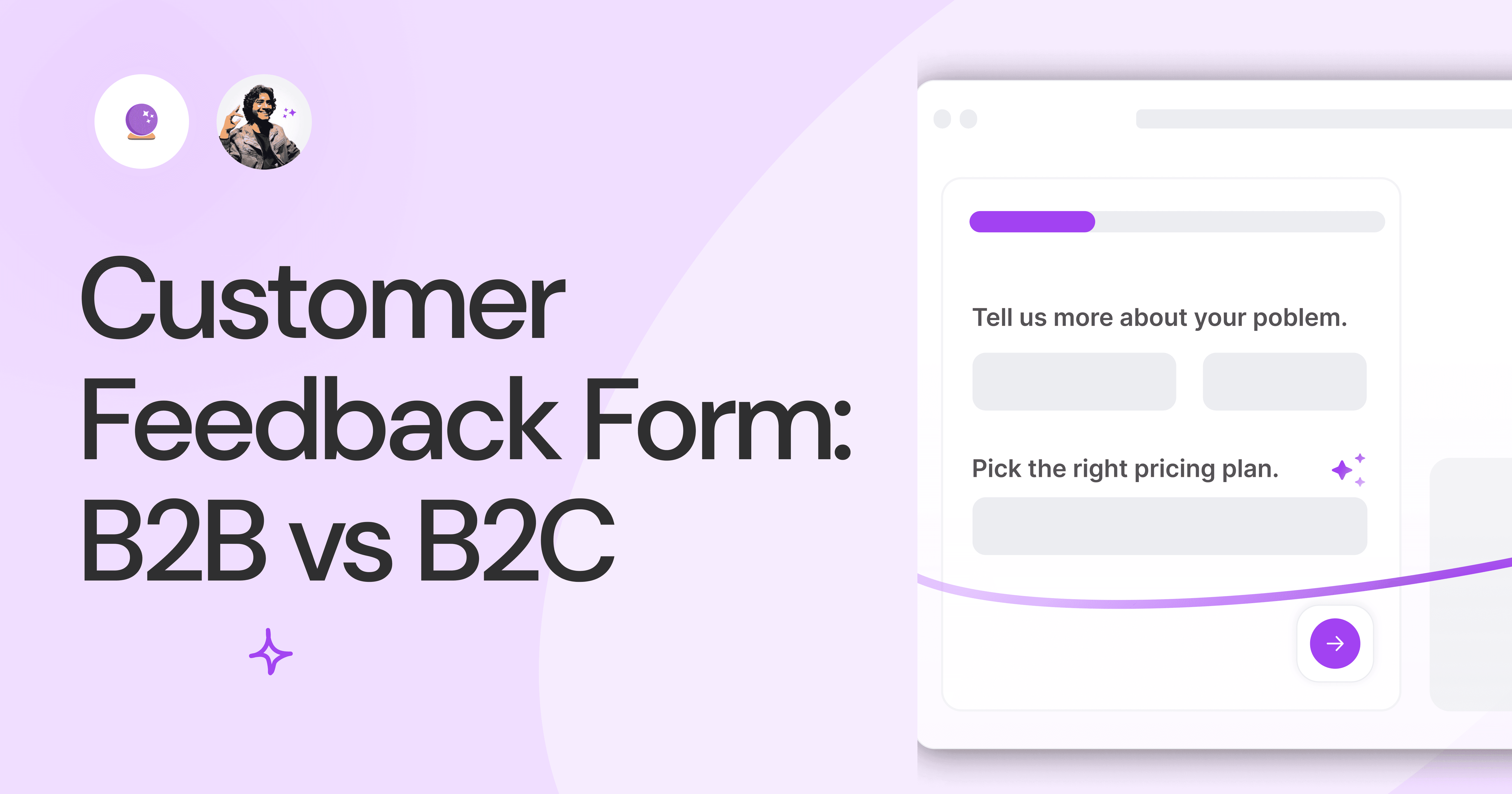
Customer Feedback Form: B2B vs B2C.
Why is customer feedback important? Because it dictates progress on B2B and B2B products and services for the customer to meet their goals.
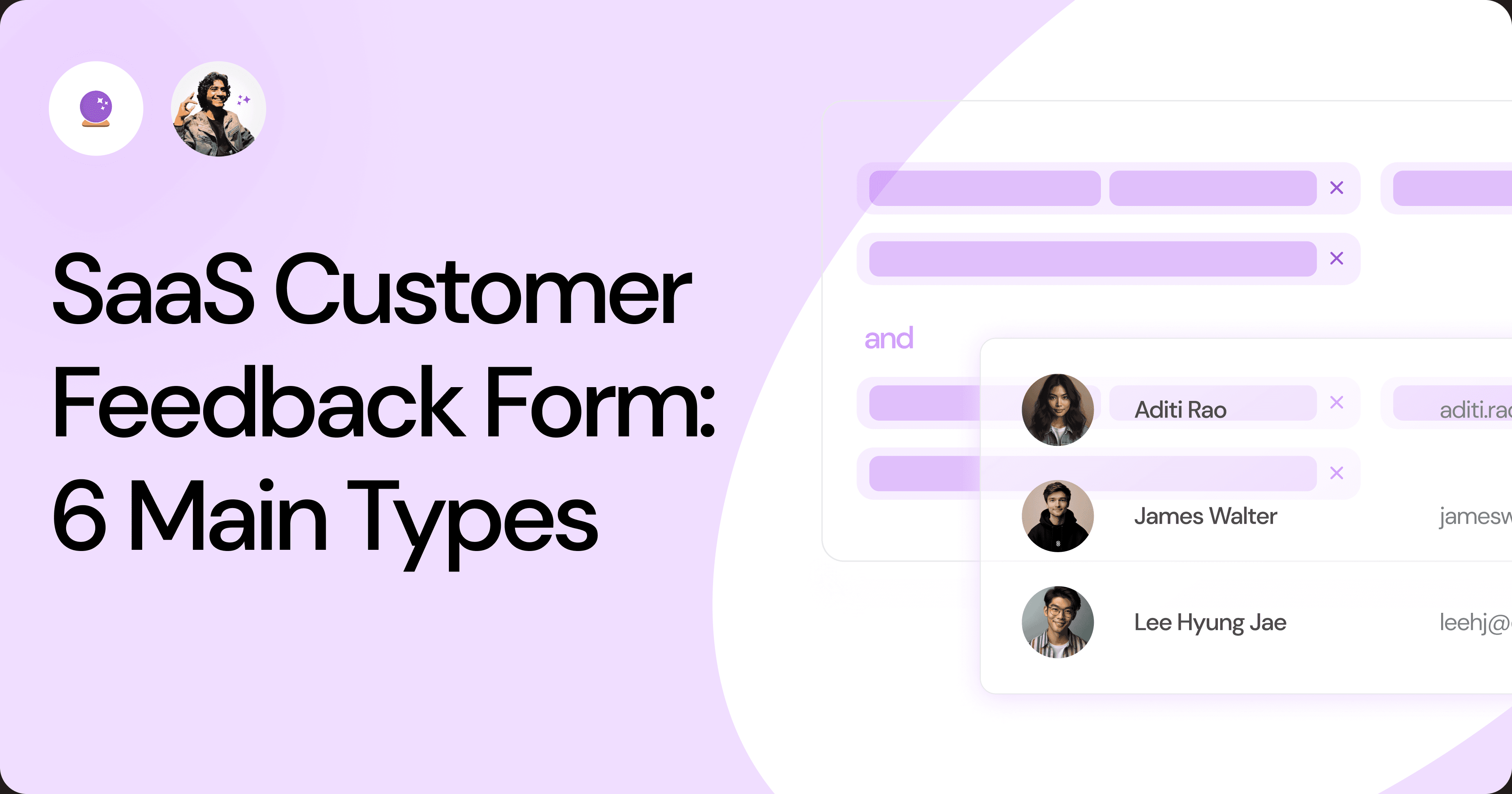
SaaS Customer Feedback Form: 6 Main Types.
As much as SaaS is self-serve, the role of a customer feedback form is highly relevant. There are different types, each with its use case and sections.

Role of a Product Survey in SaaS.
SaaS is all about creating products for specific use cases. This is where a product survey becomes all the more important to know the user deeply.

Should You Do a SaaS Market Survey?
Every SaaS company wants to grow fast. But without a market survey, growth isn't possible or sustainable. Let’s see how to do a market survey.

SAAS Pricing Calculators: B2B v B2C Online Forms.
The SaaS pricing calculator is an essential tool for both B2B and B2C SaaS companies. But how do you build it, right? We have you covered.

B2B SaaS: Making Book a Demo Form.
Having the perfect book a demo form for B2B SaaS is the first step in capturing leads. There are a few fundamental techniques to get this form right. Read on.

How to Get Started With SaaS Onboarding.
SaaS onboarding is essential for customer onboarding in B2B and B2C SaaS. Let’s understand its fundamentals, including the metrics.

Customer Feedback Form: B2B vs B2C.
Why is customer feedback important? Because it dictates progress on B2B and B2B products and services for the customer to meet their goals.

SaaS Customer Feedback Form: 6 Main Types.
As much as SaaS is self-serve, the role of a customer feedback form is highly relevant. There are different types, each with its use case and sections.

Role of a Product Survey in SaaS.
SaaS is all about creating products for specific use cases. This is where a product survey becomes all the more important to know the user deeply.

Should You Do a SaaS Market Survey?
Every SaaS company wants to grow fast. But without a market survey, growth isn't possible or sustainable. Let’s see how to do a market survey.

SAAS Pricing Calculators: B2B v B2C Online Forms.
The SaaS pricing calculator is an essential tool for both B2B and B2C SaaS companies. But how do you build it, right? We have you covered.

B2B SaaS: Making Book a Demo Form.
Having the perfect book a demo form for B2B SaaS is the first step in capturing leads. There are a few fundamental techniques to get this form right. Read on.

How to Get Started With SaaS Onboarding.
SaaS onboarding is essential for customer onboarding in B2B and B2C SaaS. Let’s understand its fundamentals, including the metrics.

Customer Feedback Form: B2B vs B2C.
Why is customer feedback important? Because it dictates progress on B2B and B2B products and services for the customer to meet their goals.

SaaS Customer Feedback Form: 6 Main Types.
As much as SaaS is self-serve, the role of a customer feedback form is highly relevant. There are different types, each with its use case and sections.

Role of a Product Survey in SaaS.
SaaS is all about creating products for specific use cases. This is where a product survey becomes all the more important to know the user deeply.

Should You Do a SaaS Market Survey?
Every SaaS company wants to grow fast. But without a market survey, growth isn't possible or sustainable. Let’s see how to do a market survey.

Nine Types of Healthcare and Medical Forms.
Medical forms are a must-have for any healthcare business or practitioner. Learn about the different kinds of medical and healthcare forms.
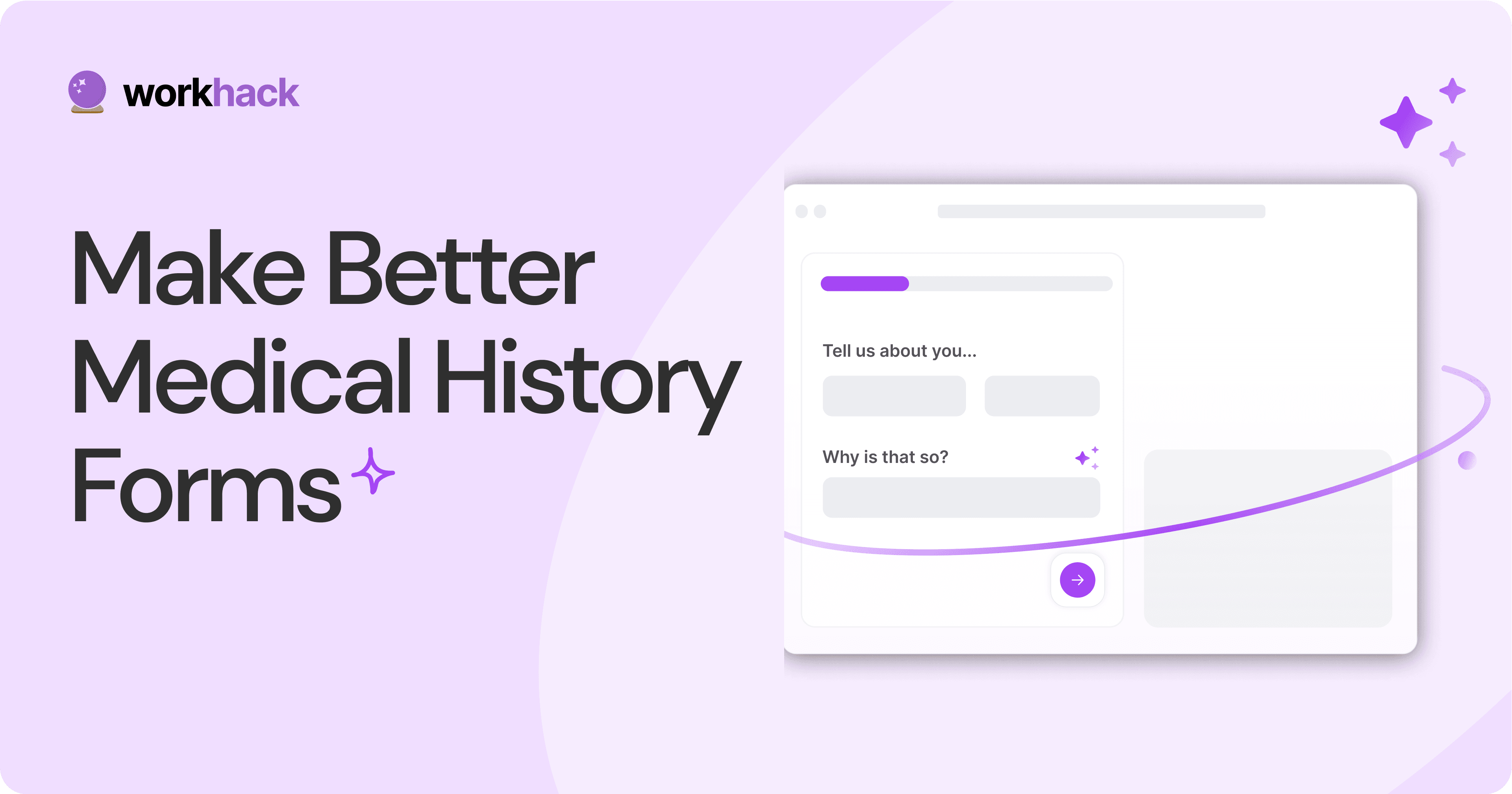
4 Tips for Better Medical History Forms.
Medical history forms are central to patient care, onboarding, and medical administration records. Learn how to make them easier to fill.
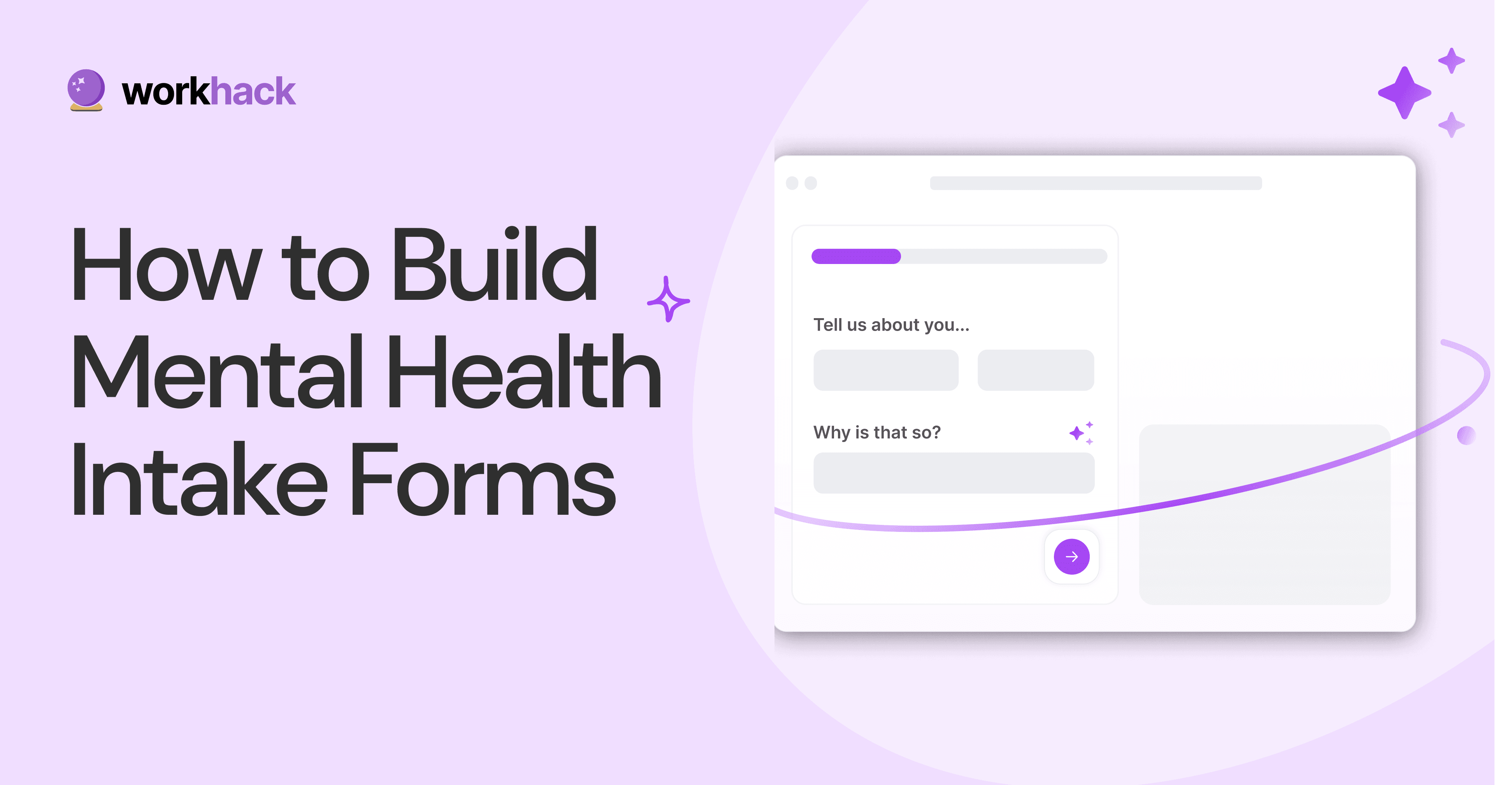
How to Build Mental Health Intake Forms?
Mental health intake forms are not like patient intake forms. Mental health intake forms deal with far more sensitive data and have specific design methods.
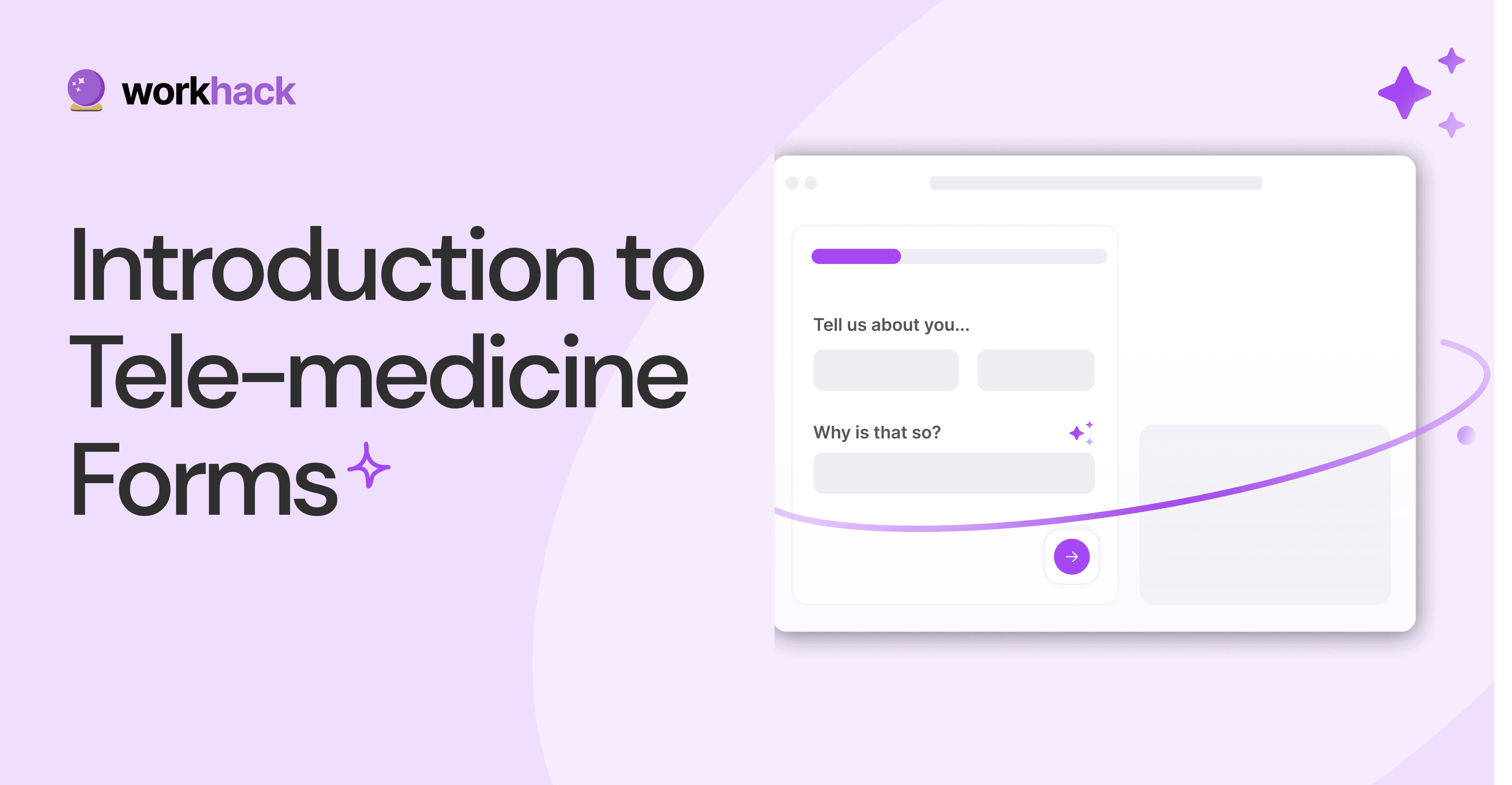
What, Why and How of Telemedicine Forms.
Telemedicine is on the rise and with different form builders out there, which one best suits your needs as a healthcare services provider?

3 Reasons for Major Drop-Offs in Medical Forms.
No matter which healthcare form we pick, there are major drop-off reasons. We shall dive into the top 3 and learn how to resolve them in your next form.
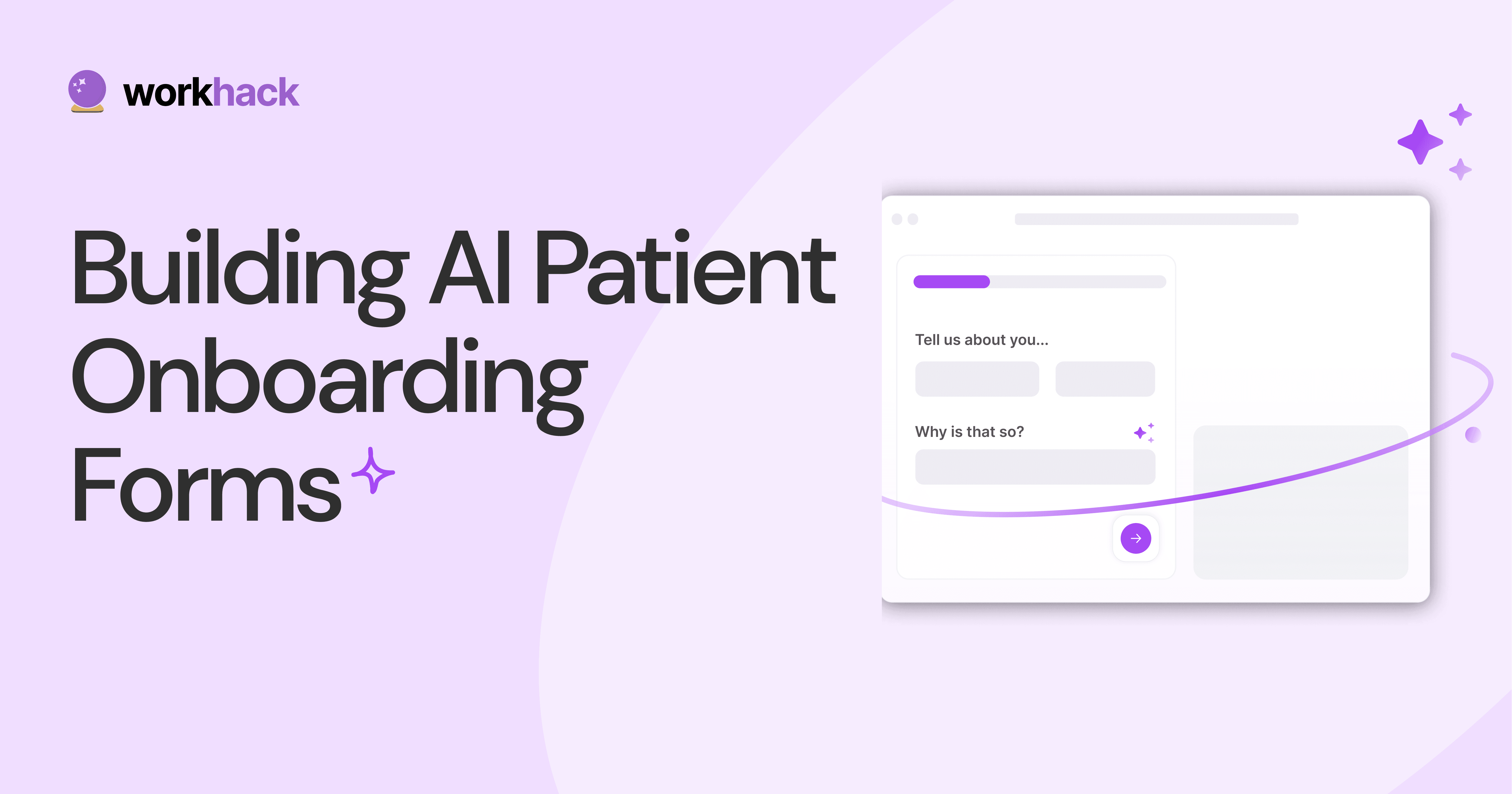
Patient Onboarding Forms - From Click to Clinic.
Patient onboarding forms are the first touchpoint for patients; getting this right for higher conversion rates is a must-have. Learn how to perfect them now.

5 Key Parts of a Good Patient Satisfaction Form.
The goal of patient satisfaction surveys is to course-correct the services of a healthcare provider. Patient feedback leads to a culture of patient-centric care.

Build Quick and Easy Medical Release Forms.
Every HIPAA-compliant healthcare provider comes across medical release forms that involve details from medical history forms. Can they be shipped fast? Yes.

SAAS Pricing Calculators: B2B v B2C Online Forms.
The SaaS pricing calculator is an essential tool for both B2B and B2C SaaS companies. But how do you build it, right? We have you covered.

B2B SaaS: Making Book a Demo Form.
Having the perfect book a demo form for B2B SaaS is the first step in capturing leads. There are a few fundamental techniques to get this form right. Read on.

How to Get Started With SaaS Onboarding.
SaaS onboarding is essential for customer onboarding in B2B and B2C SaaS. Let’s understand its fundamentals, including the metrics.

Customer Feedback Form: B2B vs B2C.
Why is customer feedback important? Because it dictates progress on B2B and B2B products and services for the customer to meet their goals.

SaaS Customer Feedback Form: 6 Main Types.
As much as SaaS is self-serve, the role of a customer feedback form is highly relevant. There are different types, each with its use case and sections.

Role of a Product Survey in SaaS.
SaaS is all about creating products for specific use cases. This is where a product survey becomes all the more important to know the user deeply.

Should You Do a SaaS Market Survey?
Every SaaS company wants to grow fast. But without a market survey, growth isn't possible or sustainable. Let’s see how to do a market survey.
Subscribe to stay updated.
Subscribe to stay updated.
Subscribe to stay updated.
HC

HC

HC

HC

70+ people from across industries read our emails.
HC

HC

70+ people from across industries read our emails.
HC

HC

HC

70+ people from across industries read our emails.




Bangalore, India / San Francisco, US
WorkHack Inc. 2023
Bangalore, India
San Francisco, US
WorkHack Inc. 2023
WorkHack Inc. 2023
Bangalore, India / San Francisco, US
WorkHack Inc. 2023
Bangalore, India / San Francisco, US



